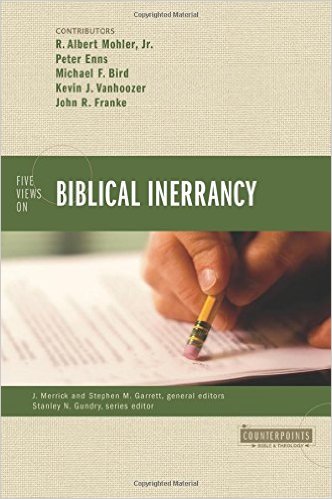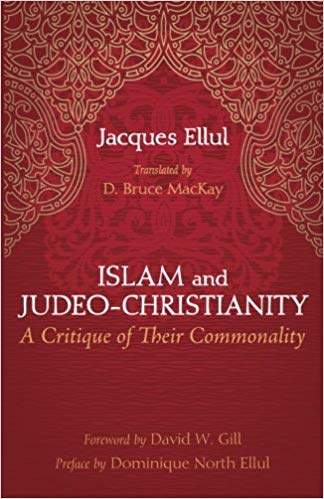Has God spoken? Have those words been written down and preserved for us in the Bible? Are those words perfectly good and true? Is the Bible absolutely trustworthy, mostly trustworthy, somewhat trustworthy? Right on some things but wrong on others? All of these questions coalesce into a debate among conservative Christians . “Inerrancy” is the term that capsulizes this conversation. This book pits 5 Christian men with varying views on inerrancy against each other. Each gets a shot at explaining how they understand inerrancy and each has to look at three passages of Scripture which seemingly purport a mistake and offer their two cents on how that Bible might still be true or not in light of these alleged errors.
This was both fascinating and spicy! Clearly, this is not a topic of casual debate. For the Christian understanding the Bible is a big big deal.
1 ) Al Mohler — The Bible must be factually accurate in every detail otherwise it cannot be trusted. In short Mohler believes that “When the Bible Speaks, God Speaks” The Bible alone and the Bible in it’s entirety, is the Word of God written and is therefore inerrant in the autographs.
The church must have a total commitment to the trustworthiness and truthfulness of the Bible, or else the church is left without a defining authority. Inerrancy is an all or nothing kind of thing. Scripture is the support beam on which Christianity is built. Christians need a trustworthy guide. If the Bible is not completely true and trustworthy then the support beam for our faith, is destroyed, and the whole thing comes tumbling down.
Mohler rejects attempts to say that Biblical authority does not require inerrancy. In no meaningful way can the Bible be authoritative in a persons life while at the same time have some errors in it. “Biblical authority is inescapably impaired if total divine inerrancy is in any way limited or disregarded.”
With an alarmist tone Mohler laments that if the Bible is not fully authoritative, fully trustworthy, then we don’t even know what Christianity is.
Mohler reasons that he is on solid ground with his position because
- The Bible teaches total inerrancy
- The tradition of the church teaches it
- The function or purpose of the Bible demands it.
But ultimately Mohler appeals to his pre-supposition first of all
“I do not allow any line of evidence from outside the Bible to nullify to the slightest degree the truthfulness of any text in all that the text asserts and proclaims. That statement may appear radical to some readers, but it is the only position that is fully compatible with the claim that every word of scripture is fully inspired and thus fully true and trustworthy”
Bottom line, since God is true his word must be true. Certainly translations can go off the rails but that’s a different matter. Given this disclosure, we already know Mohler will not struggle to much with the alleged discrepancies.
- Did the walls fall? (Joshua 6) — archeology says there was no walls in Jericho at the time Israels alleged invasion, therefore Joshua 6 is not true in a factual sense. Mohler simply throws shade on the archeological “evidence”, and finds an archaeologist who agrees with what the text says.
- Did Paul’s companions see or hear? (Acts 9:7) — The men who were traveling with him stood speechless, hearing the voice but seeing no one (Acts 22:9) — Now those who were with me saw the light but did not understand the voice of the one who was speaking to me. So did the men hear but not see, or did the see but not hear? Can’t be both so the argument goes. Mohler see’s no conflict, his presupposition won’t allow him to, but there is also a convenient explanation, in both cases, the men heard something and they also saw something, but there were unable to grasp what they were hearing and seeing.
- Is God inconsistent with himself? Duet 20:16 — Kill your enemies Matt 5:43-48 — Love your enemies — the Bible is contradictory. Mohler says it’s impossible to understand why it had to be this way, but to get to the cross the Bible has us going through Cannan. It’s all one grand, mysterious, and wonderful story. Judgment in Canaan and also in eternity is part of that story.
Criticisms of Mohler
- There is certainly criticism of Mohlers a-priori convictions. You can’t even have a discussion about errors in the Bible, because going into the conversation Mohler has already decided there aren’t any. You could slap him in the face with an error and he won’t accept it.
- Mohler’s approach is not helpful because “It is reductionistic and adversarial. It produces not a faith seeking understanding but a rational seeking certainty.”
- He is too much against extra Biblical lines of evidence. It’s ok for someone to modify their interpretations of Biblical texts and make better sense out of them based on facts that come in. Interpretations change and the text can still be trustworthy.
- There is criticism of Mohler’s appeal to the church fathers, yes, they made great claims to the inerrancy of Scripture but that was because of their commitment to spiritual and allegorical interpretation. The Bible was declared true because the hermeneutics were so flexible in their day. Augustine wasn’t interested in becoming a Christian until he discovered allegorical interpretation! The concern is that Mohler is forcing a more modernistic fact based interpretation into inerrancy. Literary devices such as myth and saga need to be considered — they were part of the landscape of the ancient world
Peter Enns
Like it or not, the Bible is empirically false at times, and must not be regarded as inerrant. The Bible tells of God’s acts but also reports some events that either may not have happened or have been significantly reshaped and transformed by centuries of tradition. Inerrancy as it has been accepted by many evangelicals like Mohler actually proves to be unhelpful because it puts expectations on the Bible that it was not meant to bear. The Bible was never meant to be read with our modern interest in accuracy and scientific precision. Strict pre-suppositional convictions on inerrancy short circuit helpful criticism, inquiry, and healthy intellectual pursuit. It’s all about the manner in which God speaks truth, namely, through the idioms, attitudes, assumptions, and general world views of the ancient authors. — some of which we now know are not technically true in a strictly modern sense. Inerrancy is an intellectual disaster for evangelicalism, and it’s gotta go!
- What about Jericho? — Didn’t happen like Joshua 6 says it does. The archaeologists are correct. This then must be an example of “Mythologized History” There is a kernel of true history to the story, but it has been retold and expanded for reasons we don’t fully know or appreciate. According to Enns the entire Exodus narrative is a myth. A small band of Jewish slaves escaped Egypt, snuck out through a dried lake bed, and created an insignificant colony in Canaan.
- What about Pauls friends — It doesn’t matter whether one account said they saw something and the other account said the heard something. We need to embrace the creative nature of ancient portrayals of the past. We cannot force the text into being burdened by modern precisionist notions of truth.
- What about the extermination of Canaanites? — That didn’t really happen either at least not to the same extent the narratives seem to indicate. These narratives were not reported events, they were tribal rhetoric. When you discard the violent narrative’s as tribal trash talk, it’s not so bad. But that’s not the main point. The point is what Jesus says and what the O.T. says cannot be neatly lined up together. Jesus is reversing the O.T. way. We don’t vainly try to justify or explain away the genocide like inerrantists are forced to do. Stuff happened in the O.T. that was tribal and brutal. It is what it is, God’s name got thrown around, now because of Jesus all that is different.
Criticism of Peter Enns
- If inerrancy falls so falls evangelicalism. It’s difficult to see the difference between Peter Enns and a liberal protestant. It’s what he sounds like. Liberal protestantism is in ruins because they emasculated the authority of Scripture. It hard not to imagine that the same problems will occur if one follows Enns.
- If one can effortlessly turn most of the O.T. into a myth, what would hinder one from doing the same to the N.T.? The answer is nothing.
- Enn’s appears to be a Marcionite — The God of the O.T. is an inferior war like tribal God that has been replaced with the loving God of the N.T. — That heresy was expunged from the church millennia ago. It’s really hard not to draw this conclusion given what he said.
- He caricature’s inerrancy as some sort of brain dead position, and then attacks it viscously. Critical inerrancy looks very seriously at literary form, grammar, and cultural context , but he seems to think it doesn’t.
- His “mic drop” ending. See it’s all a mess, quite trying to cover up the errors! What then is God’s Word? What Qualities must it have? Can the Bible be authoritative? To these questions he gives no answers.
Michael F. Bird
He doesn’t feel comfortable with the standard comment “the Bible is inerrant in it’s original autographs.” What does original autographs even mean? Several portions of both the New and Old testament had later add ons, the original Jeremiah was destroyed and then re-written. The N.T. authors were clearly more interested in the meanings of the O.T. and not it’s actual wording, because they regularly take great liberties when quoting the O.T. certainly they weren’t concerned about “the originals”. This feels to Bird like a convenient way to explain away lots of the potential problems with the Bible. “Well yes, there is that problem, but we believe it wasn’t in the originals, so we are ok”
For Bird Inspiration is a better term. Inspiration extends “to the human literary processes which preserved the meaning and power of God’s Word to achieve the ends for which it was given.”
Bird see’s inerrancy debate as a largely American phenomenon which is used primarily as a weapon for religious politics. So what does Bird believe about the Bible?
“Bible is an authentic and authoritative account of God’s actions in creation, redemption, and consumption…God does not feed us nuts of truth inside of shells of falsehood…There are bits of Scripture, inconsequential for the most part, that do not agree (with the truth) in their precise details.”
These minor inconsistencies, do not derail Birds confidence in Scripture. Nor does he feel that we should always try to defend and explain these bits of Scripture. “We should not anchor the truth of Scripture in our apologetic capabilities to beat the skeptics at their own game; I think there are better ways.”
Bird things the Bible speaks authoritatively for salvation, but not necessarily on matter of history and science. The Bible should be the ultimate standard for faith and practice, but it should stop there.
He lands his plane by rejecting inerrancy and embracing infallibility as the better term. Infallibility to Bird is the confidence that “The Bible does not fail to achieve the purpose for which God has given it, whether that purpose is asserting, promising, commanding, exhorting, praising etc.”
Jericho? — Main point of story is God fulfilling his promise to bring his people into the promised land, that happened. He is not nearly as confident as Enns in the “clear evidence” of archaeology. But he is ok if the narrative doesn’t correspond exactly to reality in certain mostly minor points.
Pauls Buddies — Ancient historians were story tellers not modern journalists. Lukes narration can be flexible on the details because that is what the genre in which he was writing allowed.
Genocide — God’s a pragmatist, it wasn’t ideal but the Canaanites had to go, and the children of God were the people for the job. This is the unfortunate but necessary provisional step on the road to Shalom in God’s master plan. You can be committed to the Bible with out having to reconcile this O.T. instance of killing your neighbours and Jesus’ admonition to love them but in order to do that you have to recognize “the contingency of divine command in less-than-ideal situations, and an acknowledgement that some commands are more indicative of God’s original and eschatological intentions than others…We don’t fully understand but we trust.”
Criticism
- Bird assumes that to hold to inherency means you accept strictly literalist interpretations. Which is not true.
- I don’t know how helpful it is to just walk off from the genocide passage by saying it’s imponderable but I trust God. — Maybe that’s all that can be done?
Kevin Vanhoozer
Vanhoozer defines inerrancy in the following way: “to confess faith that the authors speak the truth in all things they affirm when they make affirmations, and will eventually be seen to have spoken truly when right readers read rightly.”
Two things stand out about his definition.
- Vanhoozer is quit willing to give the biblical authors the benefit of the doubt. He embraces the Augustinian idea of “Faith seeking understanding.” and thus is confident that the authors words will eventually be proven true.
- The second part of his definition “when right readers read rightly” is meant to draw attention for the need to understand how truth is revealed in many ways through cultural context, genre, and authorial intent. Truth is about reality, but there is more than one way to render reality in language. Like the difference between maps, one highlight’s roads, another topography, another buried treasure, they need not contradict each other they have different purposes. a poem harbours truth in a different way than does a physics manual right readers reading rightly will know this. for example was Jesus affirming botanic truth when he called the mustard seed the smallest of all the seeds or was he drawing an analogy that his hearers would have understood in order to communicate a non botanical truth? For Vanhoozer this is not difficult, the reader was never intended to look for technical botanical accuracy.
Vanhoozer believes the Bible has difficulties but stops short of referring to them as errors. He also recognizes the pastoral importance for Christians to have an authority that is ultimately united and coherent.
The walls of Jericho — Archaeological evidence is inconclusive, however in many cases, narrative is “true history artfully presented.” Ancient narratives do not give us a completed and unbiased account of events. It’s an angle on truth. But that doesn’t mean its in error.
Damascus Road — Don’t ask what words Luke used, ask what he is doing with those words. This is a progressive reduction of the role of his companions. Paul alone is a witness to Christ’s visit upon him. Literary repetition with a difference is Lukes way of showing that Paul’s commissioning by Jesus was intended for Paul alone. That’s the point.
Racial violence vs. Radical Love — Jesus understood the O.T. as a grand story with an overarching plot — Salvation history. “At points along the story we have holy love meeting with unholy rejection. we have the Creator redeemer engaging with the forces of Chaos. Jesus could say “love your enemies” without condemning the O.T. because the conquest of Canaan was a unique and limited event — a single scene, now past — in the drama of redemption.” This event was never intended to be a model for how all future generations were to behave towards their contemporary enemies. This event has to be interpreted in the shadow of the cross.
Criticism
- It’s not fair play to simply say this difficultly is not an error because it has some greater theological purpose.
- This is the standard “be patient” and “it’s not impossible” apologetics which Enns has no interest in.
- Vanhoozer tries to systematize all of the difficulties away.
John Franke
“While the diverse parts of the biblical canon do not contradict or negate each other, neither do they cohere. — When we attempt to ease the difficulties of the multiple perspectives in Scripture to make matters more compact, clear, and manageable, we suffer the loss of plurality and diversity that is woven into the very fabric of Scripture and by extension, the divine design of God”
John is all about plurality when it comes to truth. He wants us to see the Scriptures as the Word of God in human words, and that as such its stories and teachings taken as a whole, are true and not a lie. However, he strongly rejects inerrancy. For him the principle of divine accommodation is really important. Human language is incapable of providing descriptions of God that are fully faithful to the reality of God as God. What that means is Scripture is not so much the actual words of God as it is a map that effectively guides our journey into the mission of God. The Bible points us in the right direction without the necessity of being photographically precise or drawn exactly to scale.
Another way he explains it, is as follows: Capital T truth is how God sees things, small t truth is how we see it. Witnesses to Capital T truth are contained in the human speech-acts of Scripture but these witnesses are situated and fragmentary and are therefore small t truth.
He is against the idea of forcing Scripture into conformity with others Scripture for the sake of systematic unity. Scripture doesn’t have to agree with itself, there is a plurality of truth found in the Bible is his big idea.
Instead of viewing Scripture as a true foundation it should be a web of interconnected beliefs that are a witness to capital T truth. With the web model, new evidence, fresh interpretation, and alternative viewpoints are continually assessed and incorporated as needed into the existing network of beliefs. All beliefs are subject to critical scrutiny and reconstructed, replaced, or relinquished if necessary.
Truth is not relative Franke says, but it’s a whole lot more flexible than inerrantists think.
Jericho — Doesn’t’ matter because the purpose of the text is to form a covenantal community. It’s not about details at all.
Road to Damascus — Precisionist approach is terrible. perhaps Sauls companions did not hear with comprehension in the one case. The second telling is from Paul perspective the first from Luke’s. Perhaps Paul’s companions had a different experience. There is no need to harmonize these accounts in anyway.
Genocide vs Love — Both legit perspectives — Franke believes in just war theory for example, and yet still believes in the love of Jesus. Two truths in play. The Bible is a web of varied truths.
Criticism
- He shrugs off difficulties in the Bible by saying that there is a plurality of truth, and that’s it. Difficulties aren’t difficult anymore. He is careful to say he is not a relativist. However I’m not sure how he is anything but that.
- He doesn’t really say what he believes in other than it all fits together, and errors, or conflicting truths don’t really matter because the Bible is a web that we can sort of pick and choose out of.
- God’s truth as he knows it and God’s truth as he reveals it are two different things, I’m not sure that’s a great idea. Certainly not if we want to have any confidence that we can know what God has spoken to us.
- There is no real application to his approach.
I’m sympathetic to Mohler because those are my roots. As a Christian who doesn’t want a Bible that is completely free of errors and 100% accurate on everything it talks about. However his unyielding faith in the inherency presupposition made me a bit uneasy. It was kind of like “Don’t confuse me with any facts my minds made up”.
I’m not so much persuaded by Enns. He feels more like a wrecking ball to me. That and a heretic. I’m sure he’s not, right? It just felt to me like he was a Marcianite. Plus his explanations don’t actually help explain the challenging passages in the long run.
Bird is shooting for the term “infallible”. The Bible will not fail to achieve it’s purposes, it is fully reliable for matters of faith and practice, and if it’s a little off here or there on minor points, no big deal. It’s not intended to be a science book, or a technically precise modern history book.
Vanhoozer acknowledges his presupposition that the Bible is true, but it doesn’t feel the same as Mohler’s alarmists cries. I liked his persistent reminders for us to understand how important it is to read Scripture rightly. In many way’s I felt like he was a more scholarly version of Bird.
Franke lost me in a postmodern cloud. I get the part about the plurality of truth, I think. But what is he saying then? Is the Bible really a loosely-connected web of incoherent truths that are all true in their own special way? Truth ever shifting ever changing? Truth with a capital T only known by God, and small t truth for the rest of us — I’m a bit confused.
I like Bird and Vanhoozer the most. No one had a good explanation for the genocide passages. I’m not sure there is one.




